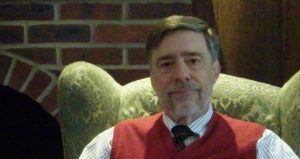 [Image: Addison’s Walk, Oxford]
[Image: Addison’s Walk, Oxford]
In the first chapter of the new book by C. S. Lewis – released by HarperOne – entitled How To Pray: Reflections and Essays, we find Lewis’ essay, “The Efficacy of Prayer,” from the 1973 book entitled The World’s Last Night, and Other Essays. The essay originally appeared in The Atlantic Monthly, January, 1959. Much of the material is similar to what Lewis writes about later in his Letters To Malcolm (1964 – composed in 1963), chapters 8 and 9.
In both places, Lewis reflects on the question of whether or not we can really prove a causal connection between our prayers and what we perceive to be the answers to them. Along with this question is the issue of what causality we can have at all in a universe with an “impassable” and omniscient God. He makes a good point: if we are willing to consider any causality in any other of our deeds, then why not in our prayers as well?
On p. 12 of How to Pray (HTP), Lewis has a nice summary of what we do not think is true of petitionary prayer: “But we can at any rate try to expel bad analogies and bad parables. Prayer is not a machine. It is not magic. It is not advice offered to God. Our act, when we pray, must not, any more than all our other acts, be separated from the continuous act of God Himself, in which alone all finite causes operate.”
As in Letters to Malcolm (LTM), Lewis’ answer to the question of “proof” of answered prayer is based, not on any kind of experimentation, but on what we know is true of the kind of interaction we have in our personal relationships. There is a “frontier” (LTM) between us where wills and wishes intermingle – causality can be confirmed or fade from consideration there.
In this essay, Lewis takes occasion to reflect on the prayer in the garden of Gethsemane, as he does in LTM – asking: is it true that the more saintly you are, the more likely a sense or certainty of answered prayer is withheld? Is it God’s way of dealing with us – or is it something inherent in Creation? Should we say that, the more mature we are in the faith – Jesus being the most mature – the less we should expect to feel we are heard; the greater the felt distance between us and God? Lewis raises the issue in opposition to the idea that God has “court favourites” who are especially blessed with certainty about their prayers. He thinks the situation is more likely that, if there are any, the court favourites are going to be those we think the least likely to be among them. Interesting.
I think that there are times when God does withhold his comforts as a test of our faith, or as a way of working out some other good purpose. But, I don’t see in Scripture that there is a set gradation in which, the higher you get, the less assured you are. It seems to me that the Lord deals with us differently at different times, based on his wisdom. I think it is true that the more mature will need to, or have to, bear with things that the less mature are not allowed to face. But, as the disciples in the upper room had to face the withdrawal of their Lord from them over the weekend, he nevertheless comforted them later. He knows our frame. And, as Lewis affirms, there are no encores. God may have withheld his presence during one difficult season, but that does not mean he will withhold it again next time – that our experience will necessarily be the same or worse because we have gotten better.
What do you think about it?
Rev. Beckmann
Reference: C. S. Lewis, How To Pray: Reflections and Essays, (New York, HarperOne, 2018), ISBN-13: 978-0062847133.
————————–
Please note that the content and viewpoints of Rev. Beckmann are his own and are not necessarily those of the C.S. Lewis Foundation. We have not edited his writing in any substantial way and have permission from him to post his content.
————————–
 The Rev. David Beckmann has for many years been involved in both the Church and education. He helped to start a Christian school in South Carolina, tutored homeschoolers, and has been adjunct faculty for both Covenant College and the University of Tennessee, Chattanooga. He founded the C.S. Lewis Society of Chattanooga in 2005. He has spoken extensively on C.S Lewis, and was the Director of the C.S Lewis Study Centre at The Kilns from 2014-2015. He is currently a Regional Representative for the C.S. Lewis Foundation in Chattanooga.
The Rev. David Beckmann has for many years been involved in both the Church and education. He helped to start a Christian school in South Carolina, tutored homeschoolers, and has been adjunct faculty for both Covenant College and the University of Tennessee, Chattanooga. He founded the C.S. Lewis Society of Chattanooga in 2005. He has spoken extensively on C.S Lewis, and was the Director of the C.S Lewis Study Centre at The Kilns from 2014-2015. He is currently a Regional Representative for the C.S. Lewis Foundation in Chattanooga.